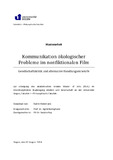Citation link:
https://nbn-resolving.org/urn:nbn:de:hbz:467-14226Files in This Item:
| File | Description | Size | Format | |
|---|---|---|---|---|
| Masterarbeit_Katrin_Hedemann.pdf | 3.86 MB | Adobe PDF |  View/Open |
| Dokument Type: | Master Thesis | metadata.dc.title: | Kommunikation ökologischer Probleme im nonfiktionalen Film : Gesellschaftskritik und alternative Handlungsentwürfe | Other Titles: | Communication of ecological issues in nonfictional film : social criticism and alternative practices | Authors: | Hedemann, Katrin | Institute: | Fakultät I Philosophische Fakultät | Free keywords: | Ecocriticism | Dewey Decimal Classification: | 791 Öffentliche Darbietungen, Film, Rundfunk | GHBS-Clases: | KNMO KNMU |
Issue Date: | 2018 | Publish Date: | 2019 | Abstract: | Diese Arbeit befasst sich mit der Theorie, Geschichte und Analyse von Umweltdokumentarfilmen aus Deutschland. Den historischen und politischen Kontext dafür bildet die wachsende öffentliche Aufmerksamkeit für ökologische Probleme. Dies steht in Deutschland in engem Zusammenhang mit der Geschichte der Umweltbewegung und der Anti-Atomkraft Bewegung. Die Arbeit zeichnet die Beziehung von Dokumentarfilmen zu sozialen Bewegungen theoretisch und historisch nach. Einen Schwerpunkt bildet die Darstellung der historischen Entwicklung von Umweltthemen im Dokumentarfilm seit den 1950er Jahren. Entsprechende Filme entstanden innerhalb wie außerhalb der Umwelt- und Anti-Atomkraft Bewegung. Sie wurden von ihnen in Umlauf gebracht, unter anderem durch Filmfestivals, und zur Verbreitung von Frames genutzt. Das heißt, Filme kommunizieren eine bestimmte Problemdefinition und Deutungen des Problems in Bezug auf Ursachen und Verantwortung sowie, implizit oder explizit, auch politische Forderungen oder Handlungen, zu denen das Publikum mobilisiert werden soll. In den letzten zehn Jahren ist eine Verschiebung zu beobachten: von dominant kritisierenden Umweltdokumentarfilmen und solchen, die sich auf Protest als Mittel der Bewegungen konzentrieren, hin zu lösungsorientierten Filmen. Diese stehen im Zusammenhang mit der Verbreitung alternativer Lebensstilpraktiken wie Veganismus, mit neuen Produktionsformen wie ökologischer Landwirtschaft und mit Graswurzelinitiativen wie Bürgerenergiegenossenschaften, Solidarische Landwirtschaft oder Transition Towns. Einen weiteren Schwerpunkt der Arbeit bildet die Entwicklung einer Methode zur systematischen Analyse dieser Frames und der sie unterstützenden rhetorischen Mittel. Sie basiert auf dem Framing-Ansatz von David A. Snow und Robert D. Benford sowie der Analyse der Filmrhetorik nach Klaus Kanzog. Exemplarisch wird die Analyse an zwei Filmen durchgeführt: der kritisierende Film "Leben ausser Kontrolle" (Bertram Verhaag, D 2004) und der lösungsorientierte Film "Voices of Transition" (Nils Aguilar, D/F 2012). Dieser Vergleich ermöglicht erste Ansätze für ein theoriegeleitetes Verständnis der stilistischen Unterschiede von kritisierenden und lösungsorientierten Umweltdokumentarfilmen. Außerdem werden Implikationen erörtert, die diese Unterschiede auf das Potenzial zur Mobilisierung des Publikums zu politischem Handeln haben könnten. The subject of my master thesis is the theory, history and analysis of environmental documentaries. The thesis outlines how environmental issues have developed in the medium of documentary film in Germany since the 1950s. The historical and political contexts of these films are the increasing public awareness of environmental problems, the environmental movement and the anti-nuclear movement. Therefore, my study explores the relationship between documentary film and social movements theoretically and historically. These often partisan films emerged from outside as well as from within these movements. They are one important medium for social movements to frame the issues: to define a problem, explain its causes, communicate responsibilities and demands and mobilise the audience. Internationally, as well as in Germany, a shift has occurred from problem-oriented documentaries and films with a focus on protest to new solution-oriented films. This shift is connected to the environmental movement, where alternative lifestyles like veganism and practices of production like ecological farming are spreading and grassroots initiatives like energy cooperatives, Community Supported Agriculture or Transition Towns have emerged. I suggest a new research method based on a combination of the framing approach from social movement research by David A. Snow and Robert D. Benford and a film studies approach on visual and auditory rhetoric of films by Klaus Kanzog. The method is systematically applied in a comparative analysis of two films: Leben ausser Kontrolle (English: Life Running out of Control, Bertram Verhaag, D 2004) and Voices of Transition (Nils Aguilar, D/F 2012). The thesis uses this approach to explore how we can theoretically understand the stylistic differences between dominantly critical and new solution-oriented films and what implications this might have in mobilising the audience to action. |
URN: | urn:nbn:de:hbz:467-14226 | URI: | https://dspace.ub.uni-siegen.de/handle/ubsi/1422 | License: | https://dspace.ub.uni-siegen.de/static/license.txt |
| Appears in Collections: | Hochschulschriften |
This item is protected by original copyright |
Page view(s)
1,112
checked on Nov 28, 2024
Download(s)
1,219
checked on Nov 28, 2024
Google ScholarTM
Check
Items in DSpace are protected by copyright, with all rights reserved, unless otherwise indicated.

